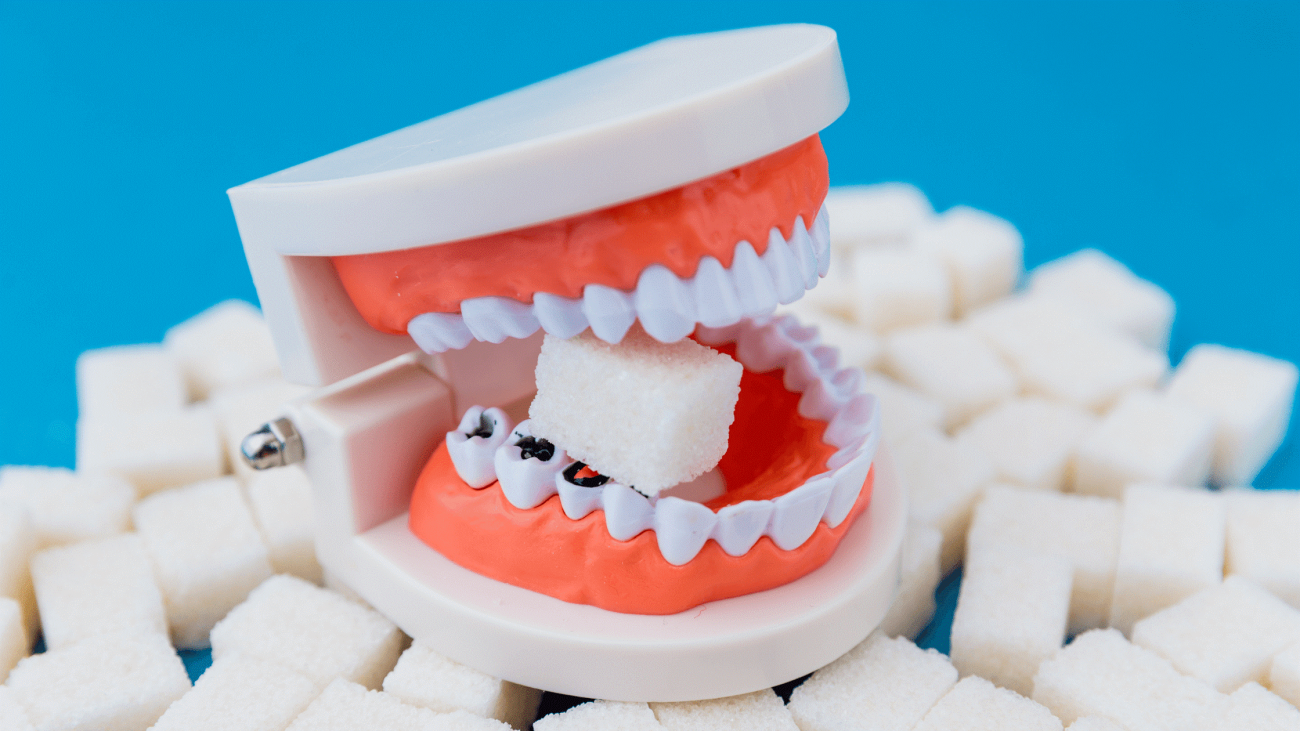We all love indulging in sweet treats—cakes, chocolates, soft drinks, and candies—but have you ever wondered what sugar does to your teeth? While sugar itself doesn’t directly damage your teeth, it sets off a chain reaction in your mouth that leads to cavities, decay, and even gum disease.
This blog will explain how sugar affects your teeth, why cavities form, and what you can do to protect your smile while still enjoying your favorite sweets in moderation.
How Sugar Affects Your Teeth
Your mouth is home to millions of bacteria—some beneficial, others harmful. When you consume sugary foods or drinks, the harmful bacteria feed on the sugars, producing acids as a by-product. These acids attack and weaken the enamel (the outer protective layer of your teeth), leading to a process called demineralization.
If this acid attack happens frequently—especially if you snack on sweets throughout the day—your enamel starts to break down, leading to tooth decay and cavities. Without proper care, the decay can progress deeper into the tooth, causing pain, sensitivity, and infections.
The Role of Plaque in Tooth Decay
Plaque is a sticky film of bacteria that constantly forms on your teeth. When sugar is consumed, the bacteria in plaque thrive and produce acid, which lingers on the tooth surface. If plaque isn’t removed by brushing and flossing, it hardens into tartar, making it easier for cavities and gum disease to develop.
Why Sugar is So Harmful
- Acid Production: Every time you eat sugar, the bacteria in your mouth produce acid for about 20 minutes. This acid erodes the enamel, making it easier for cavities to form.
- Frequent Snacking: Eating sugary snacks frequently throughout the day means your teeth are under constant acid attack.
- Sticky Sugars: Foods like caramel, dried fruits, or candies stick to the teeth and prolong the exposure of sugar to your enamel.
- Sugary Drinks: Soft drinks, energy drinks, and even fruit juices are acidic and full of sugar, making them particularly harmful for your teeth.
The Process of Tooth Decay
- Initial Attack: Sugar mixes with bacteria to form acids that weaken the enamel.
- White Spots: Early signs of enamel breakdown may appear as white spots on the teeth.
- Cavity Formation: If left untreated, small holes (cavities) form in the enamel.
- Deeper Damage: The decay spreads to the dentin and pulp of the tooth, leading to pain and infections that require fillings, root canals, or even extractions.
Hidden Sugars – What to Watch Out For
Many foods we consider “healthy” may also contain hidden sugars. Items like flavored yogurts, breakfast cereals, sauces, granola bars, and packaged juices can have high sugar content. Always check the labels for ingredients like sucrose, fructose, glucose, corn syrup, and honey.
How to Protect Your Teeth from Sugar Damage
You don’t need to cut out sugar entirely to have healthy teeth, but you do need to manage it wisely. Here’s how:
- Practice Good Oral Hygiene
- Brush at least twice a day with fluoride toothpaste. Fluoride helps strengthen enamel and repair early damage caused by acid attacks.
- Floss daily to remove plaque and food particles between teeth where your toothbrush can’t reach.
- Use an antibacterial or fluoride mouthwash for added protection.
- Rinse After Eating Sugary Foods
Drinking water or rinsing your mouth after consuming sugary foods can help wash away some of the harmful acids and bacteria.
- Limit Sugary Snacks and Drinks
Instead of frequent snacking, limit sugar consumption to mealtimes. This reduces the number of acid attacks on your teeth.
- Choose Sugar-Free Alternatives
Consider sugar-free chewing gum, snacks, or beverages. Chewing sugar-free gum stimulates saliva production, which naturally neutralizes acids and protects teeth.
- Visit Your Dentist Regularly
At Oral Medics Dental Clinic, we recommend regular dental check-ups and professional cleanings every 6 months. Routine checkups can catch early signs of cavities or enamel erosion before they become serious problems.
Sugar and Children’s Teeth
Children are particularly vulnerable to tooth decay because their enamel is thinner and still developing. Parents should:
- Limit sugary snacks and juices for kids.
- Encourage brushing twice daily with fluoride toothpaste.
- Schedule regular dental visits for preventive fluoride treatments and sealants.
The Link Between Sugar, Gum Disease, and Bad Breath
Excess sugar doesn’t just cause cavities. It can also increase your risk of gum disease because plaque buildup irritates the gums, causing inflammation and bleeding (gingivitis). Moreover, the bacteria that thrive on sugar produce foul-smelling compounds, leading to persistent bad breath (halitosis).
Myths About Sugar and Teeth
Myth 1: Only candies and sweets cause cavities.
Truth: Starchy foods like bread, chips, and pasta can break down into sugars and have a similar effect on teeth.
Myth 2: Brushing right after eating sugar is the best way to prevent cavities.
Truth: It’s better to wait 20–30 minutes before brushing after consuming acidic or sugary foods to avoid scrubbing softened enamel.
Myth 3: Natural sugars are harmless.
Truth: Honey, fruit juices, and other “natural” sugars can also feed harmful bacteria and cause enamel erosion.
Why Choose Oral Medics Dental Clinic?
At Oral Medics Dental Clinic, our focus is on prevention and patient education. We:
- Provide detailed dietary advice to help reduce sugar-related damage.
- Offer professional cleanings and fluoride treatments to strengthen enamel.
- Use advanced diagnostic tools to detect early signs of cavities and decay.
- Educate children and families about healthy eating habits for a lifetime of strong teeth.
If you’re concerned about sugar damage or want a personalized dental care plan, schedule your appointment with us today. At Oral Medics Dental Clinic, we’re here to help you achieve and maintain a healthy, cavity-free smile.
Conclusion
Sugar is one of the biggest enemies of your teeth, but its effects can be minimized with good oral care and healthy habits. Being aware of how sugar works, limiting its intake, and practicing proper hygiene can save you from painful cavities and expensive treatments in the future.

